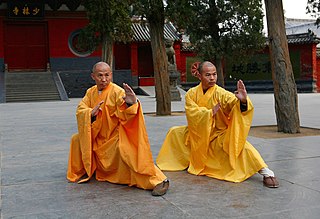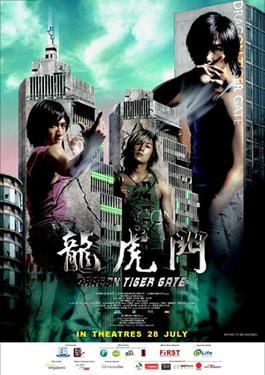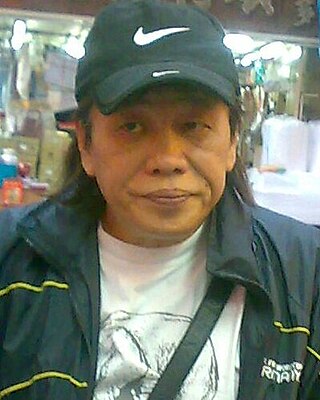
Hung Ga Kuen (Cantonese) or Hongjiaquan (Mandarin) - alternatively shortened as either Hung Ga (洪家) or Hung Kuen (洪拳) - is an ancient southern Chinese martial art, which roots lie in the Southern Shaolin kung fu. During the turn of the 3rd millennium, Hung Ga was one of the most widely practiced styles of kung fu from southern China in the world.
Wire fu is an element or style of Hong Kong action cinema used in fight scenes. It is a combination of two terms: "wire work" and "kung fu".
Corey Yuen Kwai was a Hong Kong film director, film producer, action choreographer, and actor. Yuen attended the China Drama Academy and was one of the Seven Little Fortunes. In Hong Kong, he worked on several films such as Bruce Lee's Fist of Fury (1972), Hwang Jang-lee's Snuff Bottle Connection, Secret Rivals 2, The Invincible Armour, Dance of the Drunk Mantis (1979), Ninja in the Dragon's Den (1982), Millionaire's Express (1986), and Jet Li's Fong Sai-yuk II (1993), The New Legend of Shaolin (1994), High Risk, and My Father Is a Hero.
Hong Kong action cinema is the principal source of the Hong Kong film industry's global fame. Action films from Hong Kong have roots in Chinese and Hong Kong cultures including Chinese opera, storytelling and aesthetic traditions, which Hong Kong filmmakers combined with elements from Hollywood and Japanese cinema along with new action choreography and filmmaking techniques, to create a culturally distinctive form that went on to have wide transcultural appeal. In turn, Hollywood action films have been heavily influenced by Hong Kong genre conventions, from the 1970s onwards.
Alexander Fu Sheng, also known as Fu Sing, was a Hong Kong martial arts actor. One of Hong Kong's most talented performers, Fu rose to prominence in the 1970s starring in a string of movies with the Shaw Brothers that accrued him international stardom throughout Asia and parts of North America.
Kung fu film is a subgenre of martial arts films and Hong Kong action cinema set in the contemporary period and featuring realistic martial arts. It lacks the fantasy elements seen in wuxia, a related martial arts genre that uses historical settings based on ancient China. Swordplay is also less common in kung-fu films than in wuxia and fighting is done through unarmed combat.

Dragon Tiger Gate is a 2005 Hong Kong martial arts fantasy film directed by Wilson Yip and featuring fight choreography by Donnie Yen, who also starred in the lead role. The film co-stars Nicholas Tse, Shawn Yue, Dong Jie, Li Xiaoran, Yu Kang, Chen Kuan-tai, and Yuen Wah. The film is based on the manhua Oriental Heroes, which bears the same Chinese title as the film. The film's release in all English-speaking territories is handled by The Weinstein Company.

Bruce Liang is a Hong Kong martial artist and actor who has appeared in many Hong Kong martial arts movies. He often appeared billed as "Bruce Leung", "Bruce Liang", "Bruce Leong", or "Bruce Leung Siu-lung", and is thus generally grouped among the Bruce Lee clones that sprang up after Lee's death in the subgenre known as Bruceploitation.
This is a list of films featuring the Chinese martial arts master and folk hero of Cantonese ethnicity, Wong Fei-hung. There are 123 in total. Where possible alternative titles have been included, particularly the official English language titles or literal translations.
Hsiao Ho, is a Hong Kong martial arts film actor, stunt performer and action choreographer. A Hakka, he has acted in many films directed by Lau Kar-leung, including Mad Monkey Kung Fu and Legendary Weapons of China. In 1985 he portrayed legendary kung fu warrior Fong Sai-Yuk in the Lau directed action-comedy, Disciples of the 36th Chamber and also took a lead role in Fake Ghost Catchers, directed by Lau Kar Wing. Fake Ghost Catchers is marketed by Celestial Pictures as being made two years before Ghostbusters. Hou is also known for portraying the "disfigured swordsman" and doubling complicated action scenes in 1993's Iron Monkey. He was also the action director for the movie Shaolin Avengers (1994). In 1982 he was nominated for Best Action Choreography for the movie Legendary Weapons of China at the Hong Kong Film Awards alongside Lau Kar Leung and Ching Chu who also provided choreography for the film.

Chinese Hero: Tales of the Blood Sword is a wuxia manhua series created by Hong Kong artist Ma Wing-shing. It is also referred to as Blood Sword, Blood Sword Dynasty, A Chinese Hero: Tales of the Blood Sword, and A Man Called Hero.
Hong Kong comics are comics originally produced in Hong Kong.

Tony Wong Chun-loong, better known by his pseudonyms Wong Yuk-long or Tony Wong, is a Hong Kong manhua artist, publisher and actor, who wrote and created Little Rascals and Weapons of the Gods. He also wrote adaptations of Louis Cha's novels, such as The Return of the Condor Heroes, Demi-Gods and Semi-Devils, and Ode to Gallantry. For his contribution and influencing a generation of artists in the local industry, he is regarded as the "Godfather of Hong Kong comics" or "Hong Kong's King of Comics".

Ma Wing-shing is a Hong Kong manhua artist, writer and publisher. He is best known for creating the Fung Wan and Chinese Hero series.

Heroes Among Heroes is a 1993 Hong Kong martial arts film produced and directed by Yuen Woo-ping and starring Donnie Yen as the protagonist So Chan, who was one of the Ten Tigers of Canton. The film shows opium smugglers in the Qing Dynasty, China, with Officer Lin Zexu and Chinese martial arts master and folk hero of Cantonese ethnicity Wong Fei-hung fighting against them. It was released in the US as Fist of the Red Dragon.

Louis Fan Siu-wong is a Hong Kong actor and martial artist. He is best known worldwide for his starring role as Ricky in Riki-Oh: The Story of Ricky (1991) and as Jin Shanzhao in Ip Man (2008) and Ip Man 2 (2010), as well as roles in numerous television series produced by TVB.

The Return of the Condor Heroes is a Hong Kong wuxia television series adapted from Louis Cha's novel of the same title, produced by TVB. It was first broadcast on TVB Jade from 31 October 1983 to 6 January 1984 in Hong Kong. A total of 50 episodes were produced. The serial was re-aired in 1988, 1990, 1997, 2013, and 2018 on TVB Jade.
Carter Wong is a Hong Kong actor and martial artist, who is mainly known for roles in Kung Fu action movies. The biggest movies he was featured in are Big Trouble in Little China (1986), and Yong zheng ming zhang Shao Lin men (1977). As an actor, he contributed to more than seventy martial arts films. He also worked as a stuntman in films, and was the fighting instructor for the movie Rambo III. Wong is still active in martial arts.
Chui Chung-San was a Hong Kong actor, director, choreographer, martial artist and stuntman. He was known for being an action director and stuntman. Chui was known for films such as The Rebellious Reign, Kung Fu Vs. Yoga, Two Fists Against the Law and 7 Grandmasters as well as other various Hong Kong and Taiwanese television shows.
Culturecom Holdings Limited, formerly Jademan (Holdings) Limited, is a Hong Kong company, headquartered in the Far East Finance Centre in Admiralty.









